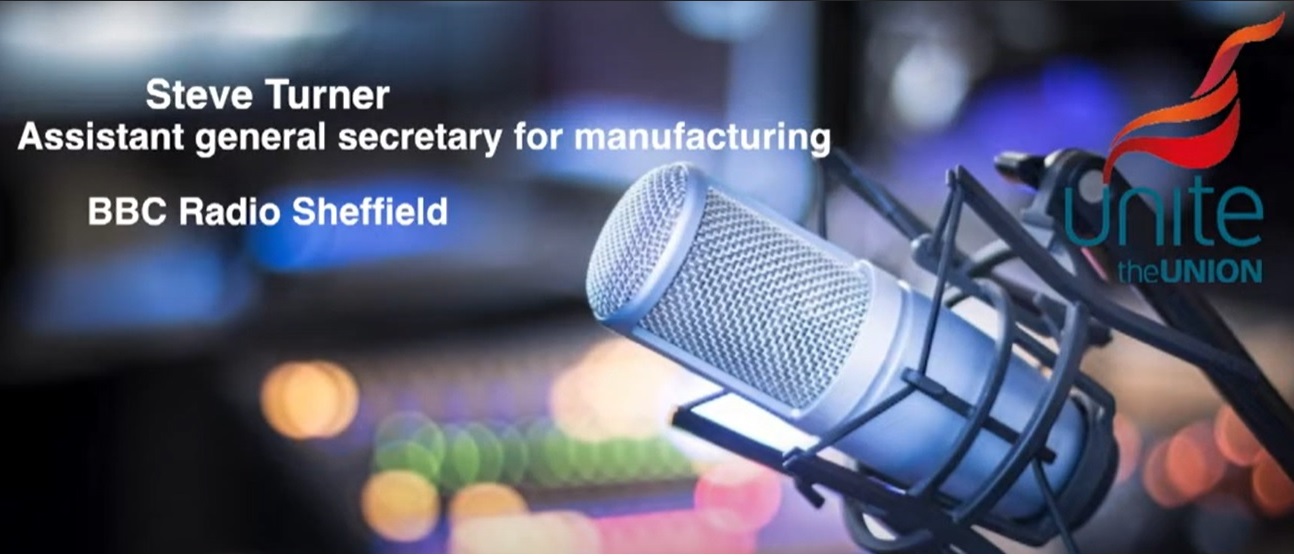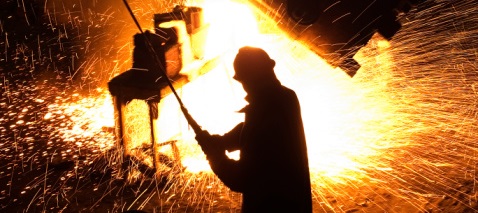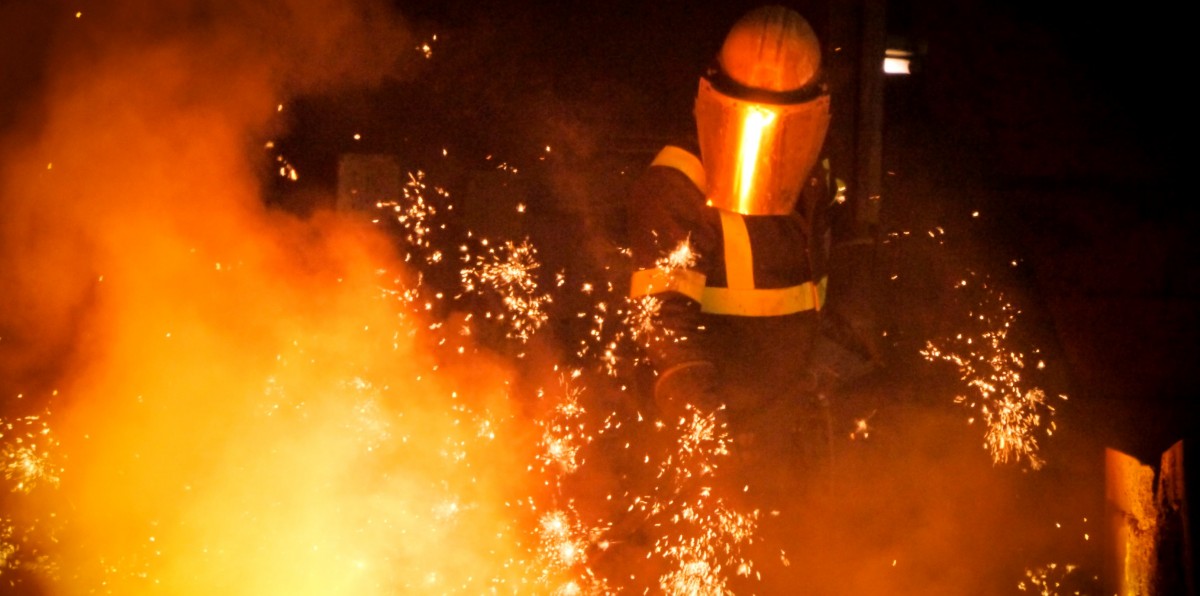â€We proved the world wrong’
It’s been nearly a year since hundreds of steelworkers from across the UK descended on Parliament in a march to save an industry that forms the bedrock of all UK manufacturing.
At the time, the sector was still reeling from the devastating shutdown of the SSI steelworks in Redcar in October 2015 – the coke ovens were extinguished and a tradition stretching back almost a century ended as more than 2,000 jobs were lost.
The closure sent shock waves throughout the community, which revolved almost entirely around steel – jobs in the wider supply chain evaporated as shops closed and overall unemployment skyrocketed.
The massive Tata-owned Port Talbot steelworks was on the precipice of the same fate, with thousands more jobs on the line after it was haemorrhaging money each day in desperate search for a buyer.
And although the Scunthorpe works had secured its own buyer, uncertainty reigned.
The industry as a whole was gasping for breath after being inundated by cheap Chinese imports as the government washed its hands of responsibility, repudiating action it could have easily taken such as supporting EU hikes on tariffs and providing relief on business and energy rates.
But a year on since that historic march — where protestors from three steel unions joined together in solidarity — against all odds, UK steel has survived.
The crisis is far from over – but the light at the end of the tunnel is visible, and it shines more brightly each day.
Stabilised
“We proved the world wrong,” says Unite Port Talbot rep Pasty Turner. “Just a year ago we were up for sale struggling to find a buyer and now we’re actually making money.”
In the end, Tata decided to keep the beleaguered Port Talbot steelworks. This year, steelworkers across Tata sites agreed to a deal that sees a change to their pensions but brings in £1bn in modernising investment and preserves nearly 8,000 jobs over the next five years.
Just last week (May 2), international industrial group Liberty House completed a deal buying Tata’s speciality steels division, a move that will secure 1,700 jobs and create 300 more jobs in South Yorkshire.
And Tata Steel’s Long Products Division in Scunthorpe saw the revival of the British Steel brand after investment firm Greybull Capital bought the site last year.
According to the firm, 100 days later, the massively loss-making site returned to profitability. Now, British Steel has agreed to reverse a pay cut it imposed on the workforce there as its fortunes improve.
Unite British Steel site convenor Martin Foster said that the last year has been a rollercoaster ride.
“A year ago, we didn’t even know whether any of us would have jobs. We had lost about £85m in a year and no one wanted to work for us,” he explained. “Now, we’re making a profit and while it’s not dramatic, things are looking up. Our apprenticeship programme has been oversubscribed. People are clamouring to work for us and there’s lots of pride in the British Steel name too.
“We’re not out of the woods but we’ve stabilised.”
Concerns
In Port Talbot, Pasty Turner says there is on the one hand a “sense of relief because we’re still here”.
“But on the other hand, people are tired and they’re angry,” he explains. “People are angry at the changes to pensions and the many sacrifices the workforce has had to make and still our long-term future isn’t secure.”
Unite SIMA branch chair Anthony Simpson, who works at a site in Shotton, agrees.
“We’ve had to accept the closure of our pension scheme to future accrual and we haven’t yet had any details about how it’s going to change,” he explained. “We’ve been promised the earth by the UK government but they still haven’t followed through with so many of the promises they’ve made.”
Simpson says the Shotton steelworks — which is and has always remained profitable even at the peak of the steel crisis last year — is still vulnerable.
“Skills retention remains a big problem,” he explained. “Because there’s still no overall stability in the steel industry, people are looking elsewhere for work.”
All three Unite steel reps expressed frustration that the UK government has made big noises about supporting the steel industry but for the most part its support has been too little, too late. On the other hand, the Labour Welsh government has gone above and beyond, Simpson notes.
It has provided millions of pounds for research and development and has also supported enhancement programmes and has allowed councils to adjust business rates, among other measures.
“In fact, what the Welsh government has done for Tata steel sites in Wales has brought stability to England,” he said, explaining that the Corby site, a Tata-owned site in England, wouldn’t be running if it weren’t for Welsh government support.
Action call
Unite and other steel unions continue to press the government to take action to create a level playing field for their industry – now doubly critical in an economic climate dominated by Brexit uncertainty.
“Beyond action on tariff controls and energy prices, what’s most important is having a manufacturing strategy with a public procurement policy and a plan for skills,” explained Unite national officer for steel Tony Brady. “But with the upcoming election, that’s all been kicked into the long grass.
“While we have seen stability in the sector, it will need massive investment in order to compete in the long-term. This can only happen if the next government creates an environment that enables the industry to succeed.”
In an unprecedented move last week (May 3), three trade unions including Unite and seven industry bodies across UK manufacturing came together to demand that the next government take strong post-Brexit action against dumped imports, which hastened the steel crisis in the first place.
Together they detailed what action should be taken in a position paper that was sent to policy chiefs in the main political parties.
“Post-Brexit the UK will be responsible for its own trade defence mechanisms which we need to be ahead of the game if we are to protect jobs and British industry,” said Unite assistant general secretary Tony Burke.
“Unite, other manufacturing unions and the trade associations which have taken the initiative believe we need robust defence structures which are simple and easy to use to protect decent jobs and our industries such as steel, ceramics, paper and tyres which are susceptible to dumping from countries such as China.
“We want the next government to act swiftly and adopt these recommendations,” he explained. “We cannot have our manufacturing industries faced with continuing uncertainty and bogged down in complex legal processes.”
Campaign success
As steelworkers look to the future with cautious optimism, Unite’s steel reps look back on a union campaign that, they say, has made this future possible.
“One thing is certain – had we sat back and not done anything, the steelworks wouldn’t be open today,” Foster argues. “The Save our Steel campaign was the biggest steel campaign we’ve had in this country in decades and it helped in forcing the government to sit up and listen to us.
“Even if reluctantly, the government made concessions, such as on business rate relief because we were in the public eye constantly. They couldn’t ignore us.”
Simpson agrees.
“The campaign kept us at the top of the media agenda,” he notes. “It’s only when public and media pressure is that strong do politicians start to address the issues.
“The campaign also showed steel members that their union was there for them, fighting their corner. When workers are facing so much uncertainty, that sort of very public, outspoken support showed members that they weren’t alone – that we were in this together with the full backing of the union. ”
For Pasty Turner, the reality is pretty straightforward.
“If it weren’t for the Welsh government and Unite, we wouldn’t be here today,” he said. “It’s that simple.”
 Like
Like Follow
Follow


